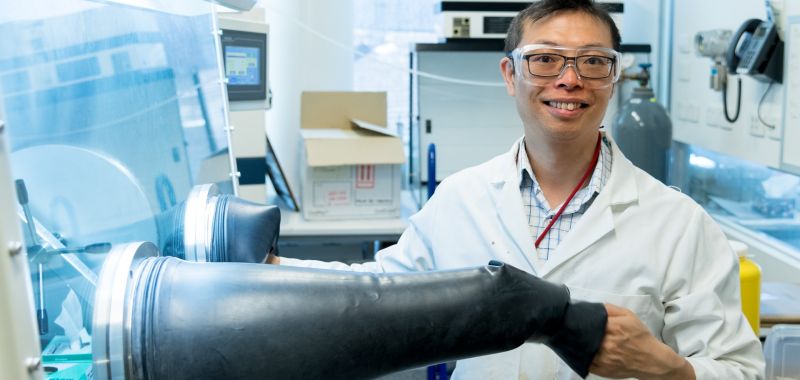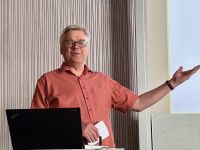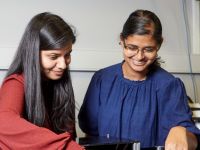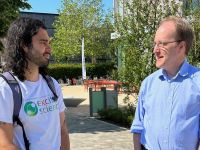
Member profile: Wallace Wong
The education and career of Wallace Wong, a Chief Investigator with the ARC Centre of Excellence in Exciton Science, has taken him from a childhood love for invertebrates to world-class expertise in synthetic, organic chemistry via Oxford and Zürich.
An Associate Professor in The University of Melbourne’s School of Chemistry, Wallace has extensive experience in organic semiconductor and fluorophore development.
He works on emerging solar energy technologies as well as novel materials for security, chemical and biological sensing.
After studying at the University of Sydney, Wallace completed his PhD at The University of Oxford, and while science was always of keen interest, a career as a chemist - and an academic - was not a foregone conclusion.
Battle of the sciences
“Perhaps earlier on, I was more interested in insects and biology a little bit more than chemistry,” he said.
“But then later on I found out that everything to do with biology originates more or less from chemistry. Anyway, you need to know chemistry to really do biology properly. Speaking now as a chemist.
“When I was at high school, I was pretty good at most of the sciences, but I was particularly good at chemistry. I would say I like the beauty of certain things. Some chemists would say they love working out the mechanism of how something worked. I kind of enjoy that, but not as much as just enjoying the beauty of a structure. The beauty of the colour, of a dye.”
Despite completing his PhD within New College at Oxford, one of the world’s most prestigious universities, Wallace was still uncertain of whether his career would lead him into academia or industry.
“I basically decided to have a go to be an academic after my first postdoc,” he said.
“After my PhD I still didn’t know what I wanted to do yet. I had a good degree, I knew that I could solve problems. I thought that I didn’t really need to do academia if I didn’t find an appropriate position. There are some cases where PhD students start out and they think they want to be an academic, but those are rare beasts. For me, definitely not. I just kind of fell into doing a PhD because I got a scholarship and thought ‘why not?’
“I knew already at that time, that the academic pathway is hard. I didn’t have huge confidence in being able to do it.”
Wallace’s scepticism proved ill-founded, as a successful postdoctoral research position in Switzerland was followed by a return to Australia with Professor Andrew Holmes at the University of Melbourne.
Wallace has remained an important member of the School of Chemistry since then, including a role with the Flexible Solar Cell Consortium.
And while contributing to sustainability and renewable energy innovation is a motivation, Wallace has not lost his love of interrogating and interacting with design and structure.
Pursuing a passion
“I just love making beautiful molecules, basically,” he said.
“That’s what I did for my PhD, that’s what I did during [my] postdoc and then that’s what I did starting out here. But ultimately I just want to construct the molecules, construct the material and study its properties.”
A member of Exciton Science since the Centre’s inception in 2017, Wallace is clear about what element of the collaborative approach he enjoys the most.
“I think it’s just access to the variety of people … you just get access to people who maybe you wouldn’t interact with normally. Except maybe say hello to at a conference and listen to a talk. Once you’re in the Centre you have to find ways to work together otherwise ... there’s no point being in a Centre.”

Among the priorities for the future of Wallace’s research is to contribute to the multiscale modelling taking place across several of the Centre’s functions.
“There’s still a huge gap there,” he said, referring to our understanding of how molecules are arranged in bulk samples.
“If you had unlimited computational power you’d probably be able to do it but nobody has that. You just have to be clever in somehow choosing the right methods to get towards it.
“And for me, as an experimentalist, [I’m motivated by] trying to develop the right examples to fit into the models and computations so we know that what we are modelling and computing and simulating is in fact close to reality.”







